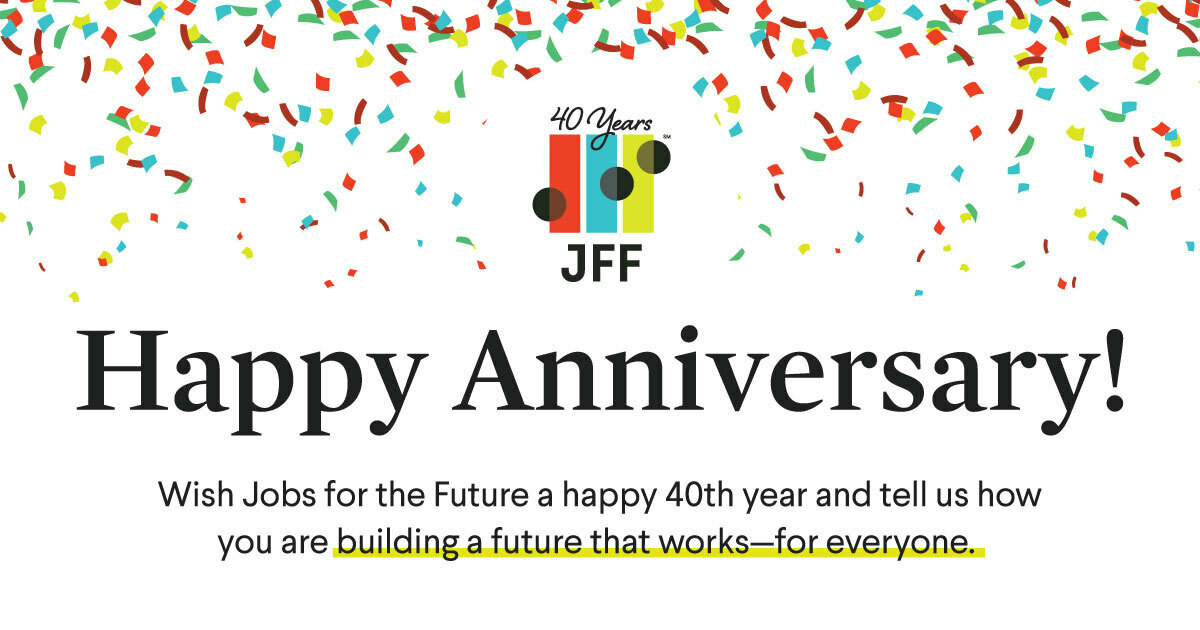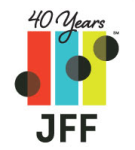
40th
Anniversary
Timeline

Building a future that works—for everyone
In the early 1980s, the team that would become JFF set out to solve a tough new economic problem: employers across the country faced difficulty finding enough highly skilled workers.
A pioneer in market research and a young Yale management school graduate founded an innovative organization to create a better balance between workforce supply and demand. Jobs for Connecticut’s Future defined the state’s workforce needs and designed education models to produce more qualified workers to meet them.
Fast-forward 40 years and many employers again have been struggling to find people with the right skills to fill good jobs. These are some of the highlights on our path to transform education and training systems so all US businesses and their workers can thrive.
1983-1989

JFF Founded to Help States Meet Economic Demands
Founded by Arthur H. White and Hilary Pennington, JFF launches partnerships with states to revamp education and workforce systems to meet pressing economic demands. Gov. Bill Clinton encourages them to bring the idea to Arkansas and JFF quickly expands to six states.
Building a Future that Works since 1983
1990
Groundbreaking Apprenticeship Models for Youth
JFF’s National Youth Apprenticeship initiative develops groundbreaking models for linking employers with schools to create career pathways. JFF’s work is featured at Bill Clinton’s economic summit and on The Today Show.
1994
Connecting School to Career
JFF helps shape the emerging school-to-career movement with essential contributions to the 1994 School to Work Opportunities Act. JFF leverages over $1 billion in seed capital.
Demonstrating Work-Based Learning
JFF launches the Benchmark Communities Initiative, a six-year national demonstration of work-based learning as a central component in revitalizing high schools.

Students celebrate their graduation from Alameda Science and Technology Institute, an early college high school partnership between the Alameda Unified School District and College of Alameda in Oakland, California.
1997
Supporting Workforce Intermediaries
JFF and partners launch the Workforce Innovation Network, which enables workforce intermediaries to serve jobseekers and the employers that hire them. With the U.S. Chamber of Commerce and the National Association of Manufacturers, the network operates for over 10 years in 21 communities and three states.
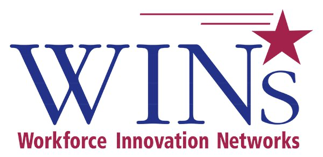
2000
Revitalizing Schools With Groundbreaking Models
JFF launches From the Margins to the Mainstream, which elevates breakthrough models for school revitalization, including college in high school, anytime/anywhere learning, and new strategies for re-engaging students who did not complete their high school degree.
Representing Diverse Viewpoints on Improving Economic Opportunity
JFF organizes Low-Wage Workers in Today’s Economy, a conference of national experts representing diverse viewpoints and constituencies, to discuss how our nation can help people from low-income backgrounds achieve long-term economic self-sufficiency.
2002
Early College Means Early Success
JFF begins its work on early college as the lead coordinator and policy advocate for the Early College High School Initiative, funded by the Gates Foundation and others, to create and redesign high schools serving tens of thousands of students each year. Federal grants later enable JFF and local partners to adapt, expand, and build the evidence base for this model.

2003
National Call to Increase College Completion
JFF challenges education leaders to increase postsecondary outcomes for young people from low-income backgrounds, organizing a national conference, Double the Numbers: Increasing Postsecondary Credentials for Underrepresented Youth, and releasing a publication from thought leaders that highlights emerging policy and practice strategies at the state, district, and school levels.

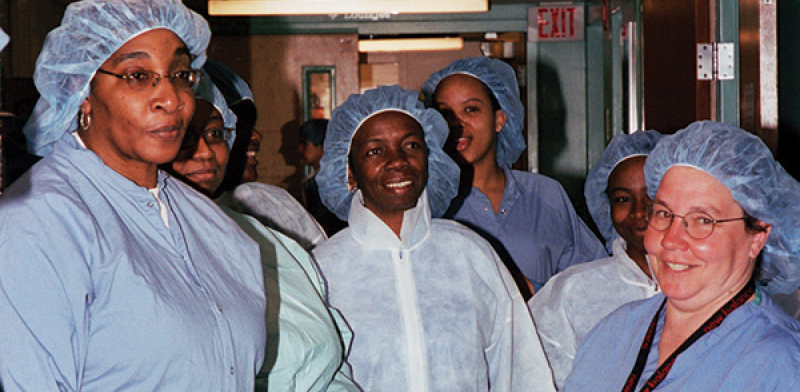
Members of a SkillWorks cohort tour their new worksite.
Partnering to Skill Up Employees
JFF helps design, launch, and implement SkillWorks: Partners for a Productive Workforce in Boston. The nationally recognized workforce and funder collaborative guides adults in low-wage occupations to find family-supporting jobs and employers to find and retain skilled employees.
2004
Spreading Early College Designs
JFF creates the Institute for Student Success in partnership with Clark University and the University Park Campus School (UPCS). The institute trains small-school developers, leaders, and teachers to implement UPCS’s proven leadership strategies and instructional techniques.

A student at the unique early college high school partnership at UPCS works on a project. His teacher is available for consultation nearby.
Supporting Workforce Intermediaries
The Annie E. Casey and Ford Foundations work with JFF to launch Investing in Workforce Intermediaries, a national support infrastructure for workforce intermediaries—unique partnerships that bring all stakeholders to the table. Focusing on improving business productivity, they also help individuals from low-income backgrounds advance to careers that enable them to support themselves and their families.
2005
Preparing for a Global Economy
In 2005, JFF brings together top corporate, education, and workforce policymakers for The Fate of the American Dream: A National Forum on Strengthening Our Education and Skills Pipeline to address the need to prepare the nation for the demands of the knowledge-based global economy of the 21st century.

Addressing Dropout Prevention and Recovery
The Youth Transitions Funders Group, a national network of grant-makers, engages JFF to help cities develop approaches to dropout prevention and recovery and to increase the number of young people who earn postsecondary credentials and enter family-supporting careers by age 26.
Launching Efforts to Stop Leaving Lower-Skilled Adults Behind
JFF helps design and lead Breaking Through: Helping Low-Skilled Adults Enter and Succeed in College and Careers to promote and enhance the efforts of community colleges helping adults expand their literacy skills to prepare for and succeed in occupational and technical degree programs. Breaking Through reaches nine states, including urban, rural, and tribal colleges.
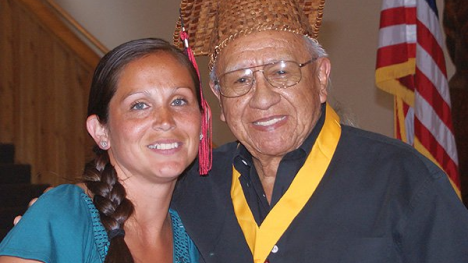
There is nothing to be found but smiles and pride at Northwest Indian College’s graduation ceremony. Students took part in Breaking Through at this tribal college in Washington State.
2006
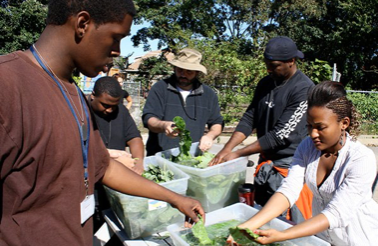
Students at Boston Day and Evening Academy try urban gardening.
Getting Disconnected Youth Back on Track to Education and Careers
JFF’s Making Good on a Promise works with national organizations and their community-based affiliates to help young people disconnected from school and work get back on track to attain educational credentials and launch an economically productive adulthood.
Advancing Frontline Health Care Workers
A dual mission of helping frontline health care workers get training to advance in their careers and improve the quality of care spurs the formation of Jobs to Careers: Promoting Work-Based Learning for Quality Care. JFF serves as the national program office for this initiative supported by the Robert Wood Johnson Foundation and other funders.

2007
Incubating a Workforce Nonprofit
JFF is the lead intermediary for a collaborative of funders in order to incubate the National Fund for Workforce, with a goal to seed and strengthen local and regional workforce partnerships.
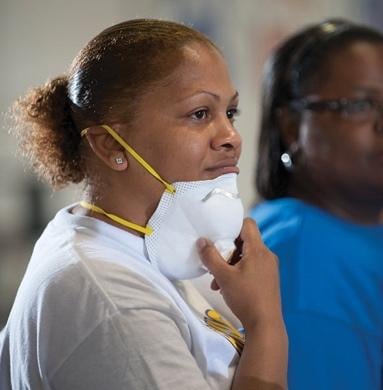
An apprentice is ready for more training in the hopes of increasing her earning potential.
Sustaining the Call to Improve Postsecondary Outcomes
JFF holds its second Double the Numbers: Increasing Postsecondary Credentials for Underrepresented Youth conference in 2007.
2008
Opening a Policy Office in Washington, DC
JFF opens a second office in Washington, DC in 2008, focused on education and workforce policy, to advocate for the adoption of federal policies, informed by practice, that accelerate credential attainment and career advancement.
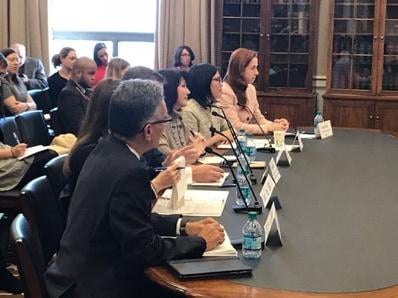
JFF’s DC office advocates for federal policy by providing testimony for Congressional briefings, attending Hill events, and more. Here, we organized a panel of employers and industry representatives to testify on the benefits and importance of apprenticeship.
Launch of Congressional Staff Network
The Policy & Advocacy Unit provides senior congressional staff with ongoing, critical access to education and workforce development system experts, practitioners, and participants through JFF’s Congressional Staff Network (CSN). The CSN takes policy staff out of the Washington, DC bubble, exposing them to evidence-based practices and challenges that confront our U.S. education and workforce development systems. Staff make valuable contacts and see the real-world implications of their policy work. The CSN is in its 15th year, providing at least three DC-based forums and two site visits annually.
2009
Reforming Developmental Education
JFF leads policy efforts of the Developmental Education Initiative, launched by six states participating in Achieving the Dream—with MDC and funding from Gates and Lumina Foundations—to support dramatic improvements for postsecondary students identified as needing remediation.

Student support matters to both students and faculty participating in Accelerating Opportunity Kentucky.
2010
Harnessing Labor Market Data to Help Workers and Employers
JFF begins Credentials that Work, a service harnessing the high-tech power of “real-time” labor market information. Data culled from online job postings enables employers and community colleges to invest in education and training programs that match the specific workforce needs of regional industries.

2012
.png?width=800&height=392&name=Rectangle%209%20(1).png)
Engaging All Students for Success
Continuing the drive toward career and college success starting in secondary school, JFF leads Students at the Center, helping educators and policymakers implement learner-centered approaches that engage each student in acquiring the deeper learning skills, knowledge, and expertise needed for college and career success.
Linking Schools to Colleges to Employers
JFF partners with the Harvard Graduate School of Education and six states to create the Pathways to Prosperity Network, building state systems of career pathways for grades 9–14. The network has added eight states or regions since.

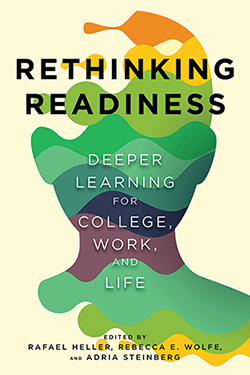
RETHINKING READINESS
JFF’s Students at the Center team has published two books of research collected from leaders in this field. This 2017 book is about increasing deeper learning outcomes.
Improving Outcomes for Adult Basic Education Students
Expanding on the work of Breaking Through, JFF leads Accelerating Opportunity, an initiative to support state community college systems seeking to improve Adult Basic Education and increase the number of adults who earn credentials that lead to family-supporting careers. In the initiative’s first three years in four states, students earned 7,000 credentials.
Influencing Community College Practice and Policy Through JFF Networks
The Student Success Center Network (SSCN) scales proven practices to help more than 4.5 million students earn credentials that lead to well-paying jobs. Nearly half of U.S. community colleges are connected to the SSCN.
Managed by JFF since 2012, the SSCN partners with nearly half of all community colleges in the United States to develop, implement, and scale student success strategies. Each of the 17 statewide Student Success Centers works with community colleges in their state to increase student completion rates, close equity gaps, and strengthen communities
2014
Scaling What Works for Youth
With the Aspen Forum for Community Solutions, JFF is awarded a Social Innovation Fund grant for Opportunity Works. The evidence-building initiative demonstrates what works to improve credential attainment and employment prospects of 16- to 24-year-olds who are not participating in education or the workforce.

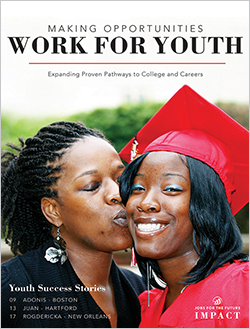
MAKING OPPORTUNITIES WORK FOR YOUTH
Rogdericka Ellis’s mother is proud of her graduating with an associate’s degree from Delgado Community College. With support from the Youth Empowerment Project as part of the Opportunity Works Initiative, Rogdericka is now studying elementary education at Southern University. JFF published this brief in 2017, documenting the successes of three young adults not connected to school or work in different states.
2015
Sharing What Works for Adult Learners Nationwide
JFF leverages a range of community college networks and stakeholders to launch Bridging the Gap, a 2015 conference featuring a cross-section of leading practices and strategies from many of JFF’s initiatives that support community college students striving to earn credentials of value in the labor market.
Opening a West Coast Office
JFF opens our third office in Oakland, California, in 2015 and launches a body of work, with funding from the Irvine Foundation and The California Endowment, to support regional- and state-level networks of leaders from education, workforce development, and industry in California. The work advances high-quality career pathways and other strategies promoting economic security for youth and adults.
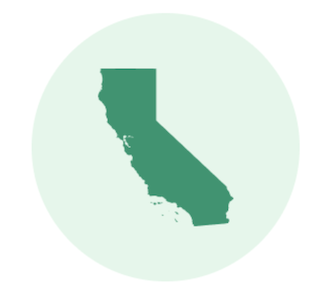
Proving Out and Scaling Up the Back on Track Model
A new initiative for postsecondary education, called LEAP (Learn and Earn to Achieve Potential), was announced on September 10, 2015. An MDRC (2019) study found that 68% of young adults participating in Back on Track through LEAP enrolled in postsecondary education. A national expansion initiative, Opportunity Works, resulted in a seven-fold increase in postsecondary completion by participants compared to a matched comparison group, according to Urban Institute (2020) research.
2016
Bridging Education and Work at Our First National Summit
JFF hosts Voices for Opportunity and Economic Mobility, our first national summit in 2016. Bringing together 650 educators, employers, funders, policymakers, researchers, and practitioners, we amplify the call for what it will take to bridge the education and workforce systems to expand economic opportunity for all.
Prototyping and Scaling Up Dual Enrollment Models Nationally
Since 2016, JFF has contributed to the strong research and evidence showing the positive impact of high school students completing early college courses. Continuing with this work, JFF is leveraging that evidence to garner over $20 million of federal investment in new dual enrollment models to expand accessibility and enhance effectiveness for thousands of young people.
2017
JFF Announces the Center for Apprenticeship & Work-Based Learning
JFF unveils the Center for Apprenticeship & Work-Based Learning (CAWBL). The goal for JFF's CAWBL is to provide national resources, best practices, and technical assistance to underpin the development of successful apprenticeships and other work-based learning strategies that strengthen the skills of workers and learners.
Expanding Our Horizons
JFF’s CEO Maria Flynn launches a new vision for accelerating and deepening our work as a field leader in the design and implementation of innovative solutions, the networking of those seeking transformative impact, and influencing industry actions to improve the educational and economic outcomes of youth and adults who come from low-income backgrounds. The vision includes JFFLabs, an affiliated innovation and invention engine that infuses JFF’s traditional field leadership with new economy thinking, relationships, and disruptive practices.

2018
JFF Joins With Google
The Workforce & Regional Economies practice joins with Google to train adults for high-growth, high-demand careers that pay family-sustaining wages in today's digital economy.

Launch of JFFLabs
JFF announces the launch of JFFLabs at the NewCo Shift Forum in San Francisco. JFFLabs provides strategy and acceleration services to scale workforce and education solutions. Working closely with some of the nation’s foremost corporations, entrepreneurs, and institutions, JFFLabs drives innovation in education and workforce systems through market insights, incubating solutions, and investing in promising companies.
Market Scans as Flagship Products
JFFLabs scans markets to identify promising technology solutions that are poised to generate significant social impact and are aligned to important innovations, such as immersive learning, career navigation, and new investments in racial economic equity. These market scans examine the market, include a map of companies that represent a range of solutions, and include impact opportunities, technology trends, market dynamics, and impact investment insights.
2019
JFF provides technical assistance and policy expertise
JFF, with language influence from the Policy & Advocacy team, provides valued technical assistance and policy expertise to policymakers on key federal legislation related to education, workforce development, and human services issues, including multiple COVID-relief packages; the Biden Administration’s Build Back Better initiative; WIOA reauthorization; the America Competes Act; the JOBS Act; and the recent creation of a $40 million Strengthening Community College Training grants program.
JFF engages state policymakers and state policy influencers in more than 40 states focused on a variety of policy topics, including equity and quality in dual enrollment; college access and success; building equitable pathways for Black, Latinx, and Indigenous youth and youth experiencing poverty; the Big Blur; apprenticeship; short-term credentials; and other issues related to economic advancement. A sample of states with the deepest engagement includes Colorado (Big Blur policy advisement), Hawaii (state recovery roadmap), Kentucky (dual enrollment), Illinois (income share agreement regulatory framework legislation), Texas (design and implantation of work-based learning framework authorized through HB 1247), and North Carolina (postsecondary policy audit for equity barriers).
JFF Focuses on Inclusive Regional Economic Development
JFF focuses on building resilience and advancing shared prosperity in communities through inclusive regional economic development. JFF works throughout California to co-design strategies that recognize the interdependence of people, places, and economic development in affecting an individual’s economic advancement.
CAWBL Launches Effort to Modernize Apprenticeships
The Center for Apprenticeship & Work-Based Learning launches its efforts to modernize apprenticeship by increasing access to Registered Apprenticeship programs for more than 700 young adults ages 16-to-24 who do not have connections to school or employment.
Investing in Innovation
This period marks an exciting time of growth and expansion for JFF. In 2019, we acquired the Employment Technology Fund (now JFFVentures) to support innovators looking to bring new solutions to the education and workforce eco-system. Recently, we welcomed the Education Quality Outcomes Standards (EQOS) to the JFF portfolio.
During this time, JFF has also launched two new Centers, our Center for Justice and Economic Advancement and our Center for Racial Economic Equity.
JFF Establishes Research & Analytics Unit
JFF establishes the Research & Analytics Unit to institutionalize the application of our research and evaluation capacity to drive evidence-based practice and policy and deepen our impact in the field.

JFF’s Corporate Action Platform is Launched
The Employer Mobilization practice announces the launch of an ambitious framework developed with support from JPMorgan Chase: JFF’s Corporate Action Platform. A primary component of the platform is the Talent Framework, designed to mobilize and support companies as they move toward becoming Impact Employers. The framework includes both traditional components of corporate talent strategy—like recruiting and retaining employees—and emerging practices for reskilling and offboarding workers displaced by globalization or new technologies.
Entrepreneur-in-Residence Incubation Cohorts
JFFLabs works with entrepreneurs and growth-stage companies to accelerate and scale the work-based learning workforce and education technology innovations. Cohorts have included entrepreneurs and startups with technology solutions focused on work-based learning, assessments, immersive learning, career navigation, pathways to tech careers, and climate resiliency.
The Changemakers Series is Launched
The Employer Mobilization practice launches the Changemakers series, which tells the stories of people at the center of a growing movement that’s reshaping the way companies invest in the well-being and advancement of their workers. Changemakers are corporate visionaries who are passionate about their companies and want to make the world a better place to live and work.
First Impact Employer Summit is Held
The Employer Mobilization practice hosts the first Impact Employer Summit, a full-day gathering in New York City to support and mobilize a community of corporate changemakers who understand that investing in the well-being of their workers is the new business imperative. Attendees include corporate social responsibility, human resources, and operations executives from Fortune 500 companies representing various industries.
2020
JFF Launches the Racial Economic Equity Initiative
JFF launches the Racial Economic Equity initiative (eventually becoming a Center at JFF in 2022), a new body of work focused on accelerating Black economic advancement.
Launch of the Future of Work Grand Challenge
Led by workforce development boards, the Workforce & Regional Economies practice partnered with six communities to launch the Future of Work Grand Challenge to validate cutting-edge technology to help displaced workers rapidly reskill so they could move into higher-wage jobs.
JFF Receives $8.8 Million Grant
JFF receives $8.8 million in capacity-building grants from the Walmart Foundation and an anonymous donor, which enables JFF to launch new initiatives, invest in new operational systems, and plan and execute JFF’s Designing for Growth and Well-Being (DFGW) reorganization.

National Landscape Analysis is Conducted
The Research & Analytics Unit team conducts a national landscape analysis of secondary-level trades education, commissioned by Harbor Freight Tools for Schools. The study gathered perspectives of career and technical educational leaders across the United States and examined data from 37 states to understand what programs are offered, who participates in them, and what outcomes students experience.
Policy Agenda is Published
The Policy & Advocacy Unit provides a transition paper to the incoming Biden Administration for achieving an equitable economic recovery.
2021
JFF Releases Call to Action
The Center for Racial Economic Equity releases a call to action specifying foundational priorities (disrupt occupational segregation and eradicate the Black-white wealth gap) and high-leverage strategies for Black economic advancement.
Advisory Council Launch
The Center for Racial Economic Equity launches an Advisory Council of Black leaders to inform research and solutions.
Release of Accelerating Black Economic Advancement Reports
The Center for Racial Economic Equity conducts and releases research on advancing Black learners and workers in tech, expanding professional social capital for Black learners and workers, and creating effective wraparound supports to accelerate career advancement.

JFF Receives 10 Federal Awards
JFF receives 10 federal awards in Fiscal Year 21, including a $13 million Department of Labor (DOL) grant for a new National Innovation Hub in Diversity, Equity, Inclusion, and Accessibility in Registered Apprenticeship, a $10 million DOL grant for IT training, a $4 million Department of Education grant for dual enrollment work-based IT courses, and a $2.1 million Education Department contract to improve digital literacy instruction in adult education.
Casting a New Vision for Transforming Learning Systems
JFF’s white paper, The Big Blur, argued for erasing the boundaries between high school, college, and careers and creating one new system that works for everyone. It urged the field to give up tinkering and instead take on a radical rethinking and restructuring of grades 11 through 14—the last two years of high school and the first two years of college—in order to increase success for all. JFF is activating the vision through partnerships with state leaders making visible strides toward blurring their systems, with a knowledge network of local and state-level innovators who have been developing precedent-setting prototypes of the Big Blur and forming and advancing policy recommendations and frameworks for the field to adopt and adapt.
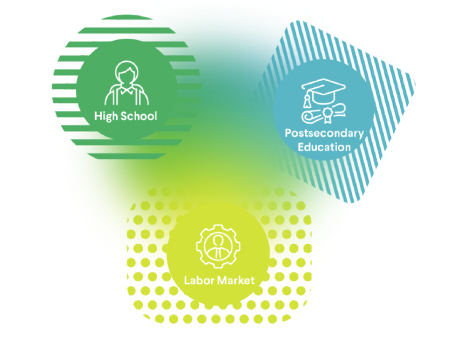
When Policy Meets Practice Podcast is Launched
The Policy & Advocacy Unit launches the When Policy Meets Practice podcast series, which features conversations with community college leaders who are members of JFF’s Policy Leadership Trust about policy approaches that produce results for workers, learners, and employers, and those who are falling short.
The Recovery Playbook for Impact Employers is Released
The Employer Mobilization practice releases the Recovery Playbook for Impact Employers, designed to help employers set a new standard for inclusive economic opportunity and advancement for their employees. Drawing on insights from a year of work with senior executives from JFF Recover Stronger Coalition members, including Walmart, JPMorgan Chase & Co., and Autodesk, the playbook provides recommendations for how large employers can work across the talent life cycle to support employee-centric approaches to post-pandemic recovery.
Launch of the National Innovation Hub on Diversity, Equity, Inclusion, and Accessibility in Registered Apprenticeship
JFF launches the National Innovation Hub on Diversity, Equity, Inclusion, and Accessibility in Registered Apprenticeship, a Department of Labor Center of Excellence that expands access and equitable outcomes within Registered Apprenticeship opportunities.
JFF Partners With the Ascendium Education Group
JFF announces its partnership with the Ascendium Education Group to support “Ready for Pell,” a two-year, $4.7 million initiative to strengthen postsecondary education programs for students who are incarcerated and prepare institutions of higher education for the return of Pell Grant eligibility for learners who are incarcerated.
2022
JFF Receives $104.5 Million in Grants

JFF receives $104.5 million in new grants and contracts in fiscal year 2022, a 28.5% increase from fiscal year 21 and a new record for the organization.
Launch of Advisory Service Practice
The Center for Racial Economic Equity launches an advisory services practice with community colleges in two states and creates a model for promoting and scaling Black learner success.
Relaunch of Executive Branch Network
The Policy & Advocacy Unit relaunches the Executive Branch Staff Network (EBN), which provides senior executive branch staff with ongoing, critical access to education and workforce development system experts, practitioners, and participants and provides at least four Washington, DC-based forums per year.
Education Quality Outcomes Standards (EQOS)
JFF acquires Education Quality Outcomes Standards (EQOS) to evaluate the quality of education and training programs and improve outcomes for learners and workers.
JFF Receives $19.1 Million From the Ares Foundation
JFF received the largest private award in its history from the Ares Foundation, $19.1 million, to support the Climate-Resilient Employees for a Sustainable Tomorrow (CREST) initiative.
JFF Launches Quality Jobs Framework
The Workforce & Regional Economies develops the Quality Jobs Framework that identifies a comprehensive definition of a quality job based on what’s important to workers today and a new, modern approach to securing what all workers deserve—not just a living wage and benefits but also stability, flexibility, autonomy, and equitable economic advancement.
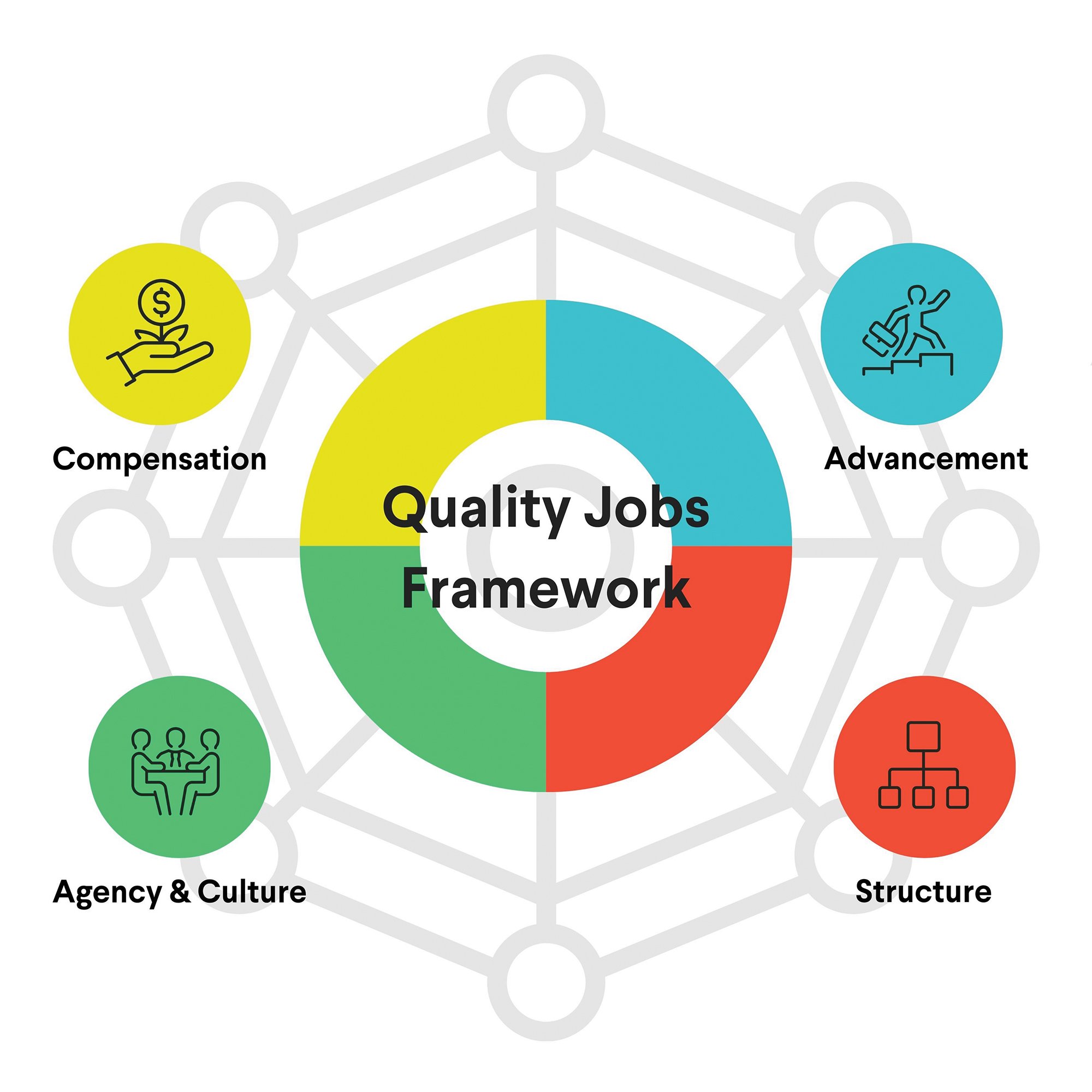
JFF Launches the Center for Justice & Economic Advancement
JFF announces the launch of its new Center for Justice & Economic Advancement to focus on building an equitable workforce for the more than 70 million people who have criminal records. The Center leads efforts to break down systemic barriers that indefinitely penalize people with records and create equitable opportunities that give them a fair chance to pursue quality jobs that match their talents, skills, and aspirations.
Release of Building Effective Technology Internships Study
The Research & Analytics Unit team publishes a ground-breaking three-year study called Building Effective Technology Internships, funded by the National Science Foundation, showing that community college technology internships can be effective bridges to employment for postsecondary students. The study was followed by a subsequent examination of these internships as they moved online during the COVID-19 pandemic.
The Pathways to Prosperity Network Reaches 10 Years
JFF and the Harvard Graduate School of Education catalyzed a movement in 2012 to create accelerated paths from high school to a wide array of postsecondary credentials and degrees with strong value in the labor market by integrating work-based learning and early college opportunities. At the 10-year mark, what was once a unique call to action is now increasingly echoed and invested in by many state leaders, philanthropy, and federal agencies—so much so that Pathways to Prosperity is now building from its existing network to encompass a broader coalition to maximize JFF’s ability to support the next phase of system changes nationally.
Release of Research Sheds Light on Equity Impact of ISAs Study
In collaboration with JFF’s Financing the Future, the Research & Analytics Unit team releases the findings of an analysis of equity in income share agreements (ISA) called Research Sheds Light on Equity Impact of ISAs. The study explored differences in contract terms and repayment patterns across demographic groups.
Release of Diversity and Equity in Apprenticeships for Young People
In collaboration with JFF’s Center for Apprenticeship & Work-Based Learning, the Research and Analytics team publishes Diversity and Equity in Apprenticeships for Young People, the findings of an analysis of 10 years of national data on Registered Apprenticeships to examine the participation and outcomes of young adults. The findings identified persistent inequities in access and outcomes and occupational segregation among female workers.
Dave’s Killer Bread Foundation Acquisition
JFF announces that it has acquired the nationally respected Second Chance Hiring program from Dave’s Killer Bread Foundation. The program, inspired by Dave’s Killer Bread co-founder Dave Dahl’s personal experiences with incarceration, provides training to and produces resources for employers on how to adopt and implement fair chance hiring.
2023
JFFLab Announces New Incubated Practice Area: Lifelong Learning
JFFLabs announces Lifelong Learning as an incubated practice area to pioneer a new approach to postsecondary education by curating and building a life-wide learning marketplace. By identifying emerging learning models, vetting new technologies designed to serve learners outside the two- and four-year college systems, and bringing lived experiences to the forefront, this practice will define and amplify the language, standards, and options that define the new marketplace.
Launch of the Postsecondary Education in Prison CTE Accelerator Network
With support from the ECMC Foundation, the Center for Justice & Economic Advancement launches the Postsecondary Education in Prison CTE Accelerator Network. As part of this two-year project, 16 postsecondary institutions and supporting organizations will refine and expand their current career and technical education programs and launch new ones as part of this unique and first-of-its-kind community of practice.
Launch of Policy Framework
The Center for Justice & Economic Advancement publishes its groundbreaking policy framework that calls on policymakers to break down barriers to economic opportunity—and establish policies that create equitable economic advancement—for the 70 million people in the United States with criminal records. The actionable recommendations are designed to expand the talent pool available to fill critical workforce gaps and build a more equitable and just society.
Bipartisan Legislation is Published
Through JFF’s Financing the Future initiative, JFF helps design multiple regulatory rules and pieces of legislation to create regulatory frameworks for income share agreements and other forms of income contingent financing. These include bipartisan legislation introduced in the U.S. Senate and regulatory rules in Colorado and California.
North Star Campaign Launch: Quality Jobs for 75 million People
JFF launches a bold call to action for our ecosystem to join us in achieving a new North Star goal: In 10 years, 75 million people facing systemic barriers to advancement will work in quality jobs.
Horizons Summit
JFF holds its largest Horizons summit to date (1500 attendees) in New Orleans. The summit convenes leading thinkers and innovators transforming the education and workforce system to explore without limits.

Center for Artificial Intelligence Launch
JFF announces the launch of our Center for Artificial Intelligence & the Future of Work, shaping AI's impact on skills development, job quality, and equitable outcomes.
.jpeg?width=445&height=250&name=JFF%20AI%20Announcement%20Graphic%20(1).jpeg)
The Action Collaboratives is Launched
The Employer Mobilization practice launches the Action Collaboratives, a meeting series designed to bring corporate leaders together to ideate and problem-solve cross-cutting issues related to talent and enabling equitable career advancement for employees.
JFF Launches JFFVentures
JFF announces the launch of JFFVentures, a new impact investing arm that will manage funds focused exclusively on emerging technologies with the potential to improve economic advancement for workers in low-wage jobs. The new investment arm marks a major expansion of JFF's growing focus on technology investing and acceleration, building on the organization's 2019 acquisition and incubation of the Employment Technology Fund (ETF@JFFLabs).
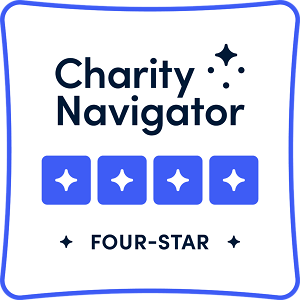
Learn more
Jobs for the Future is a registered 501(c)(3) nonprofit. Your donation is tax-deductible. Visit our Charity Navigator page.


